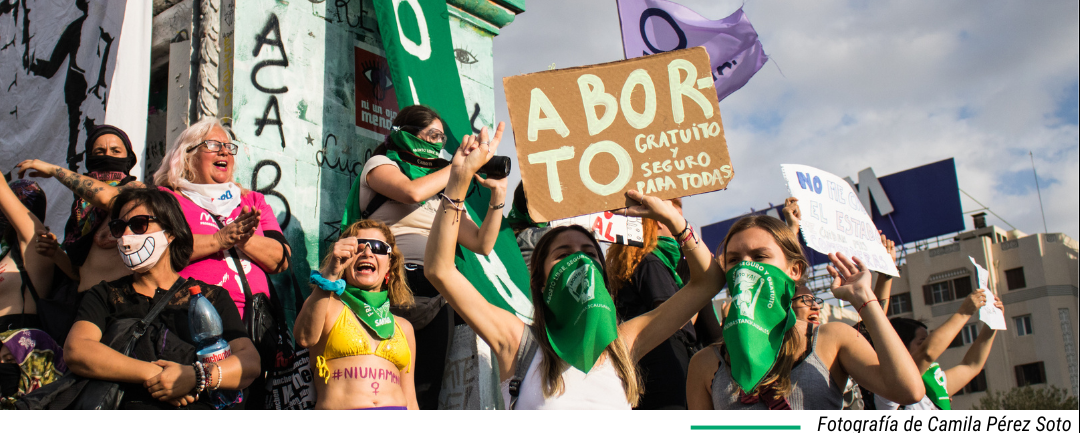
The recent approval in the Constitutional Council of the article that establishes the protection of the life of “the unborn” has marked the debate for this new Global Day of Action for Legal Abortion. If this proposal for a new Constitution is approved, the right to abortion would be put at risk on three grounds achieved in 2017 with the Voluntary Interruption of Pregnancy Law (IVE). We spoke with various feminist organizations about this topic and the implications it would have for the lives of women and pregnant people.
In recent weeks, the discussion on legal abortion has been reinstated on the public agenda, regarding the process of discussing a new Constitution. This is the amendment made to article 16, paragraph 1, which declares that "The law protects the life of those who are yet to be born", attributing the character of a person to those who have not yet been born, unlike the current text which indicates that the law protects the life “of the unborn.” The drafting of the text - led by the ultra-conservative Republican party and other right-wing parties - have built a scenario in which, if the new Constitution is approved, regulations such as the Voluntary Interruption of Pregnancy Law (IVE) would have to be repealed. In addition to the fact that Chile would have a Magna Carta even more conservative than the current one, created in 1980 during the dictatorship.
The IVE Law grants the right to abort under three causes: risk to the mother, fetal inviability and rape. It has been in force since 2017 and to date has allowed 3,609 people to abort, according to preliminary data from the Department of Health Statistics and Information of the Ministry of Health.
Various organizations that work for the right to decide have expressed rejection and concern about the implications that this article could have for all people, especially women and pregnant people.
“The change proposed by the Council has wanted to be recorded as something unimportant when it comes to language, but in practice, changing the what for the who, revives the debate that had already been settled in relation to when the condition of person. This hindered various conversations in the past, generating difficulties for, for example, allowing the distribution of the PAE morning-after pill, and also of course for the approval of the Law on Interruption of Pregnancy on three grounds,” explains Débora Solís, Director. Executive of APROFA, an organization that has been working for sexual and reproductive rights for more than 50 years and part of the Abortion Action Roundtable.
From the Association of Feminist Lawyers (ABOFEM), they explained that “the current context seems complex and the proposal in perspective for our rights seems very serious to us, taking into account the dramatic decrease in guarantees and health benefits that it could imply for women in the country; even more so taking into consideration that it could lead to the questioning of Law 21,030, which decriminalizes abortion on three grounds.” Likewise, they emphasized that this article and the speeches they represent demonstrate that today there is a political intention to limit the rights of girls, women and pregnant people.
For their part, the activists of the Más Salud a la Calle Foundation – which works from community health in the Metropolitan Region – pointed out that “this article proposal would have a high impact on the health of girls, adolescents and women, understanding the need for the attention that this requires, becoming risk situations for people's health. According to data from Amnesty International, on average 25 million unsafe abortions are performed each year in the world, which has an impact on the population requiring this procedure, and consequently on a social level.
A territorial vision
Women's organizations and gender-based dissidents have been fundamental in democratizing access to information on the application of the IVE Law and the right to abort. Through education and communication actions they have managed to place this access in different contexts and perspectives, but all crossed by a vision of the self-determination of bodies and seeking the social decriminalization of abortion.
The Las Fieras de Ancud Collective gave us a look that allows us to understand the situation from the territorial dimension. For example, in the context of Chiloé, which is where they work, geographical conditions and access to information are elements that often configure a complex scenario for those who require care in relation to possible abortions.
“When you enter the archipelago, the issue of connectivity and access to information and that it is also relevant, based on evidence, is even more difficult. There is also the moral issue, which is very powerful because many women have abortions and then it is like a blur: we don't talk about it anymore, it remains like that, but like in a tomb," they point out from the Collective.
All the organizations consulted agree that education and communication on these issues are very necessary, also remembering the relevance of the coordination between organizations and activists.
In this sense, Débora Solís points out: “If we go back to the long discussion that took place to achieve the approval of the IVE Law, the pressure and surveillance exerted by civil society organizations was key to achieving progress, since These are the ones that receive the citizen pulse and the demands of the people who require that public policy take charge of their problems, especially when these are part of Sexual Rights and Reproductive Rights.”
In the opinion of the organizations consulted for this article, the challenges that arise in this scenario are to be able to go beyond the speeches that criminalize abortion, defend sexual and reproductive rights, educate and make information available to the various territories of the country. .
In this last point, the actions carried out by social organizations of women and gender-based dissidents are of vital importance, who are working every day in their places to be able to install these issues.






